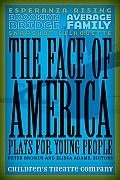
The Children’s Theatre Company of Minneapolis
All four of the plays deal with the sometimes charged relationships between ethnic groups, and with parental absence. Larissa Fasthorse’s Average Family is composite of historic Native/Euro-American relations phrased in a way to which today’s non-indigenous youth can hopefully relate. Two families, an assimilated Indian one (with minimal family cohesion) and a redneck one (who are their own little militia), are pitted against each other on a reality show. A ten-year-old Russian-American girl searches her multi-cultural apartment building for a pen in Melissa James Gibson’s Brooklyn Bridge, all while negotiating her emotionally complicated relationship to her mother who is always at work. In Lynn Alvarez’s Esperanza Rising, a twelve-year-old Mexican girl leaves her mother to work in California
What do I make of these plays? I find Brooklyn Bridge America Monroes
Is The Face of America an interesting anthology that asks significant questions about today’s youth? Certainly. Is it rife with plays that I would want to see, or perhaps produce? No. Brooklyn Bridge
No comments:
Post a Comment